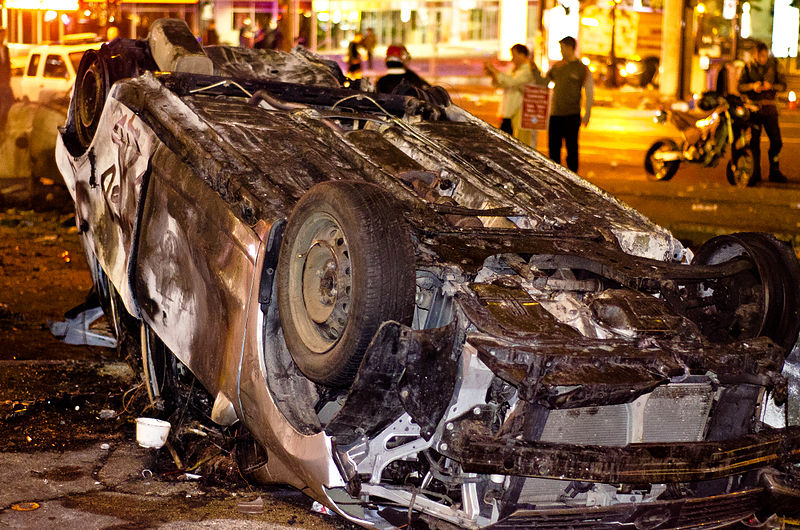The Fragile Civil Order
The distance between a hockey riot in Vancouver and a genocide in Rwanda is much smaller than you think.
 On Wednesday the Vancouver Canucks professional hockey team, after compiling the best record in the National Hockey League's regular season, winning three earlier playoff series, and battling the Boston Bruins in a Stanley Cup final series in which the home team won each of the first six games, lost the seventh and deciding game in their home arena, 4-0. Shortly before the final horn sounded in this bitterly disappointing defeat, a four-hour rampage began in the center of Vancouver in which cars where torched or overturned, businesses were looted and burned, firefighters were attacked and store employees were terrorized. Property damage totals well into the millions. About 100 people were arrested during the disturbances. More arrests are likely; many of the rioters made no effort to hide their identities, some even describing their actions on Facebook and Twitter.
On Wednesday the Vancouver Canucks professional hockey team, after compiling the best record in the National Hockey League's regular season, winning three earlier playoff series, and battling the Boston Bruins in a Stanley Cup final series in which the home team won each of the first six games, lost the seventh and deciding game in their home arena, 4-0. Shortly before the final horn sounded in this bitterly disappointing defeat, a four-hour rampage began in the center of Vancouver in which cars where torched or overturned, businesses were looted and burned, firefighters were attacked and store employees were terrorized. Property damage totals well into the millions. About 100 people were arrested during the disturbances. More arrests are likely; many of the rioters made no effort to hide their identities, some even describing their actions on Facebook and Twitter.
The violence occurred in what is usually regarded as one of the most livable cities in the world. A cultured and prosperous Pacific Rim economic center surrounded by abundant natural beauty, it is hard not to like Vancouver. It does have its tough part of town—the drug-ridden Downtown Eastside—but the riot did not spring from that neighborhood. This was by no means the first hockey riot in Canada; Vancouver itself had an earlier, though smaller, one in 1994 when the Canucks lost the Stanley Cup to the New York Rangers.
The burst of primal behavior in Vancouver reminded me of an article written more than ten years ago by John Mueller of Ohio State, who examined the nature of ethnic violence in Yugoslavia and Rwanda in the 1990s. Mueller argued that the bloodletting in those countries was due less to some peculiar ethnic geography than to “essentially mild, ordinary people,” as he put it, coming under the influence of small bands of armed thugs. A disturbing corollary of Mueller's analysis, he argued, was that what happened in Yugoslavia and Rwanda “could happen just about anywhere.” He reflected on some of the possibilities in advanced Western countries—even mentioning hockey in Canada, although he was referring to violence on rather than off the ice:
England may seem rather tranquil and well ordered in many respects, but it is also the home of some of the world's most notorious soccer hooligans. Canada often seems to be a nation of eminently reasonable people, but that is not the conclusion one would draw from watching a hockey game. Denmark may today remind people mainly of Hans Christian Andersen and little mermaids, but it once was the home of world-class marauders, and it seems unlikely that that propensity has been fully bred out of the race in the intervening centuries.
There have been other indications, such as Stanley Milgram's famous obedience experiments at Yale in the 1960s, of how it does not take much to get even essentially mild, ordinary people to be willing to inflict pain on their fellow citizens. And such tendencies have underlain acquiescence in much greater horrors such as the rise of the Nazis in Germany.
All of this should serve as a reminder of how fragile are the patterns of civilized, orderly behavior that are easy for those who live in advanced Western countries to take for granted. Maybe some of those patterns persist less because they are deeply ingrained than because we do not yet happen to have encountered a competing passion that can overturn them. If passion over a hockey game can do it, there are probably many other potential triggers that could as well. The triggers are unpredictable and probably to a large degree unavoidable.
We may be able to reduce the risk of upsetting peaceful, civilized patterns of behavior, however, by condemning consistently any action and speech that is suggestive of violence—of the Sarah Palin “don't retreat, reload” variety. Also helpful would be the rigorous avoidance of collective actions (such as torture) that start straying from the values that embody respect for humanity and that underlie the peaceful and reasonable civil order that we enjoy.
Image by rommy ghaly
